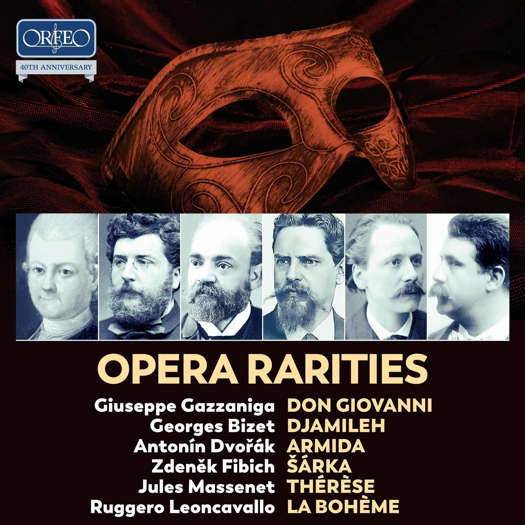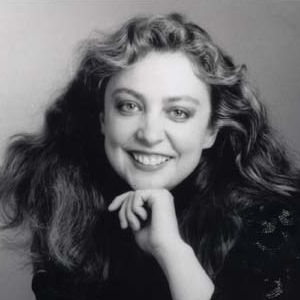- Pyotr Ilyich Tchaikovsky
- Singaporean
- Szymanowsky
- Maria Nockin
- heavy metal
- Guildhall School of Music and Drama
- Didier Gold
- The Polar Express

A Jewel Box of Opera Rarities
GIUSEPPE PENNISI explores a CD set marking the Orfeo International label's first forty years
'... at least two masterpieces emerge ...'
Among the initiatives of the record company Orfeo for its forty years of activities, there is a box certainly precious for those who love opera. Its title is Opera Rarities. It contains recordings of radio performances of six works that are mentioned often in histories of music but that are almost never on the billboard. There are very few recorded versions of these works, never poured into CDs and difficult to find. They are Don Giovanni by Giuseppe Gazzaniga, Djanileh by George Bizet, Armida by Antonín Dvořák, Šárka by Zdeněk Fibich, Thérèse by Jules Massenet and La Bohème by Ruggero Leoncavallo.
Of these titles, I remember a stage production in Italy of Leoncavallo's La Bohème at the Teatro La Fenice in 1990. I do not recall any of the others being staged, at least in Italy. The recordings in the box set were made in the eighties and nineties of the last century by the ensemble of Munich radio, Vienna radio, Rome Rai (when it existed), and the radio of the Czech Republic. Performances were deemed for radio broadcasting, the tapes of which were remastered and then rendered stereophonic in CDs. They feature great conductors, all very famous: Stefan Soltész, Lamberto Gardelli, Gerd Albrecht, Sylvain Cambreling and Heinz Wallberg.
An analytical review of the six titles and their performances would require numerous pages and would only interest specialized readers. In giving a glance to the six titles, at least two masterpieces emerge: they have been almost forgotten, especially because the audiences preferred works of the same content by other composers, contemporary to their authors: Don Giovanni by Gazzaniga and La Bohème by Leoncavallo.
The former (to a libretto by Giovanni Bertati) was staged in Venice only six months before the Mozart opera with the same title received its debut in Prague. The libretto is very similar to that by Da Ponte, but unlike Mozart's opera this Gazzaniga's work alternates musical numbers with spoken parts. Some moments, however - for example Pasquariello's catalogue aria - have many similarities to numbers of Da Ponte-Mozart's work: eg Leporello's catalogue aria.
Listen — Giuseppe Gazzaniga: Dell'Italia, Ed Alemagna (Don Giovanni)
(CD 1 track 11, 0:31-1:29) ℗ 2021 Orfeo International Music GmbH :
It is possible that Da Ponte had witnessed a performance of Gazzaniga's work at the Teatro San Moise in Venice and had drawn inspiration from it. Unlike Mozart's opera, Gazzaniga's work is a funny comedy and does not have the demonic trait that Mozart infuses in the plot, as clearly shown in the finale.
Listen — Giuseppe Gazzaniga: Far devi un brindisi alla città (Don Giovanni)
(CD 2 track 11, 18:17-19:10) ℗ 2021 Orfeo International Music GmbH :
It is a work that deserves to be produced, especially as there is a cast of young voices available.
The latter (to a libretto by Leoncavallo himself) presents a different reading of Murger's novel to Puccini's, which had its debut a year earlier in Turin. The division into acts is only slightly different from Puccini's work but the tenor is Marcello (Franco Bonisolli in this production) and Rodolfo (Bernd Weikl) the baritone. The dramaturgical and musical cut is, however, very different. Leoncavallo, who had made 'verismo' an identity flag, does not offer a lyrical and dreamy interpretation of the bohemians. Instead, it a crude representation of their poverty and loneliness in the bourgeois and wealthy world around them.
Listen — Leoncavallo: Brava, bravissima! Come cantava! (La Bohème)
(CD 10 track 1, 0:01-0:56) ℗ 2021 Orfeo International Music GmbH :
There is also a political touch: it is 1897 and there is a sense of socialism approaching becoming a protagonist in Italian life. Heinz Wallberg fully shows these characteristics: Lucia Popp is magnificent as Mimi, then very young; she died early due to a brain cancer. Two of her arias are marvellous.
The other four works are interesting. Armida is Dvořák's last opera. I believe it has been staged only in Bohemia, and also rarely there, but illuminates on the composer's last season. A good sample is the lush Finale.
Listen — Dvořák: Finale (Armida)
(CD 5 track 14, 3:25-4:22) ℗ 2021 Orfeo International Music GmbH :
Fibich's Šárka is full of inventiveness and has excellent orchestral colours. There is no shortage of nods to Wagnerian writing.
Listen — Fibich: Shadows of departed souls (Šárka)
(CD 6 track 2, 0:00-1:00) ℗ 2021 Orfeo International Music GmbH :
Listen — Fibich: Come! In my arms that touch a fiery heart I'll carry you (Šárka)
(CD 7 track 16, 1:00-2:50) ℗ 2021 Orfeo International Music GmbH :
Bizet's Djanileh is a youthful work that reflects the oriental and exotic style of the early twentieth century as in the duet with Lucia Popp and Franco Bonisolli.
Listen — Bizet: Finale (Djanileh)
(CD 3 track 17, 0:00-0:55) ℗ 2021 Orfeo International Music GmbH :
Gardelli's conducting is very good.
Massenet's Thérèse is a drama about a woman divided between loyalty (to her husband) and love (for a young man) in the years of the French Third Republic; Agnes Baltsa is excellent in the title role.
Listen — Massenet: Qui vient là (Thérèse)
(CD 8 track 15, 0:00-0:22) ℗ 2021 Orfeo International Music GmbH :
Listen — Massenet: Il est sauvé! Adieu le cher passé! (Thérèse)
(CD 8 track 17, 1:47-2:28) ℗ 2021 Orfeo International Music GmbH :
Overall, this is a small casket with six jewels, of unequal value, but nonetheless to admire and enjoy.
Copyright © 16 April 2021
Giuseppe Pennisi,
Rome, Italy

CD INFORMATION: OPERA RARITIES




